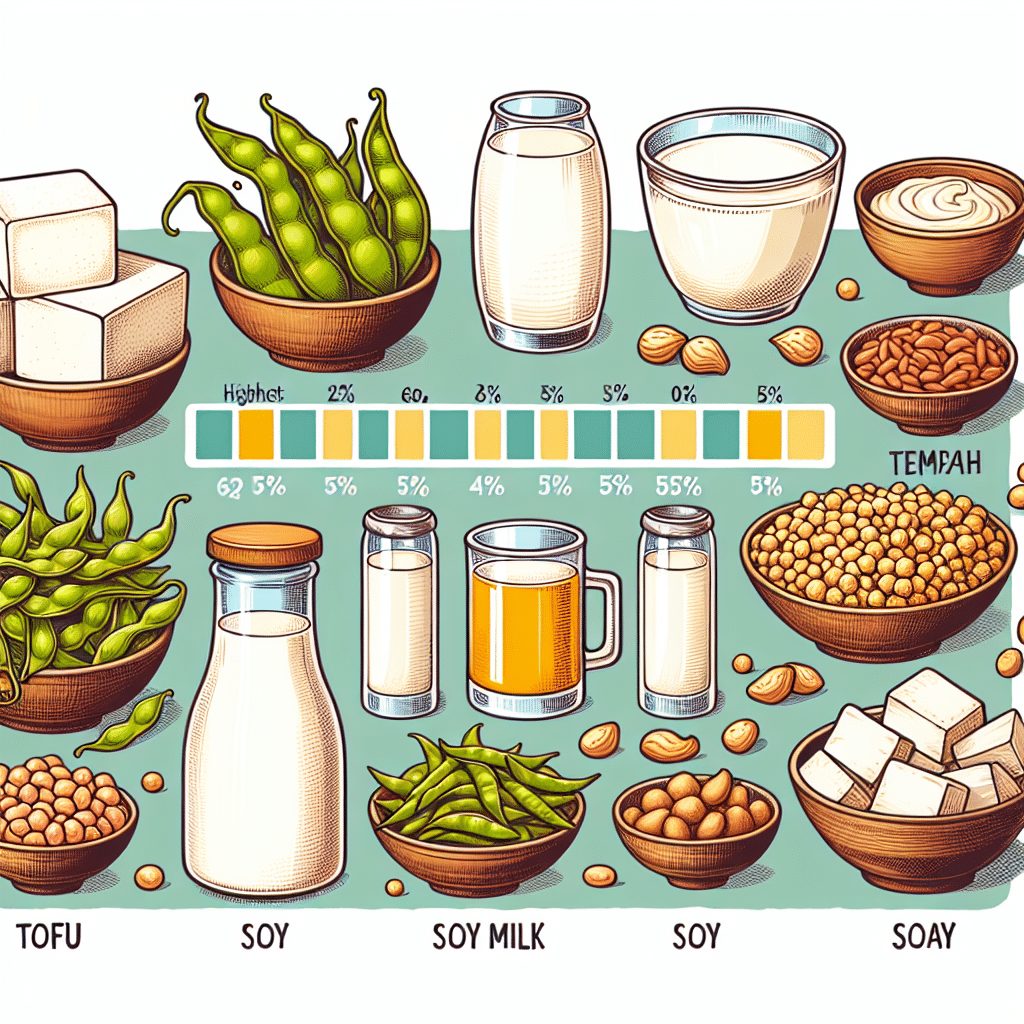What Food Has The Most Soy?
-
Table of Contents
- Soy-Rich Foods: The Ultimate Guide to High-Soy Content Nutrition
- Understanding Soy and Its Nutritional Profile
- Foods with the Highest Soy Content
- Whole Soybeans (Edamame)
- Tofu
- Tempeh
- Soy Milk
- Soy Protein Isolate
- Miso
- Soy Sauce
- Soybean Oil
- Nutritional Benefits and Considerations
- Case Studies and Statistics
- Conclusion: Incorporating Soy into Your Diet
- Discover ETprotein’s High-Quality Soy Products
Soy-Rich Foods: The Ultimate Guide to High-Soy Content Nutrition

Soybeans have been a staple in Asian diets for centuries and have gained popularity across the globe due to their nutritional benefits and versatility. Soy is a complete protein, meaning it contains all nine essential amino acids necessary for human health. It’s also a source of vitamins, minerals, fiber, and has been linked to various health benefits, including improved heart health and reduced risk of certain cancers. In this article, we’ll explore the foods that contain the highest amounts of soy, their nutritional profiles, and the role they play in a balanced diet.
Understanding Soy and Its Nutritional Profile
Soybeans are the primary ingredient in many traditional and modern foods. They are rich in protein, isoflavones (a type of phytoestrogen), and several essential nutrients. Before diving into the foods with the highest soy content, it’s important to understand the nutritional value of soy itself.
- Protein: Soybeans are an excellent source of plant-based protein, making them a popular choice for vegetarians and vegans.
- Fats: Soy contains healthy polyunsaturated and monounsaturated fats, including omega-3 fatty acids.
- Fiber: Soybeans are a good source of dietary fiber, which is beneficial for digestive health.
- Vitamins and Minerals: Soy is rich in B vitamins, vitamin K, folate, potassium, magnesium, and zinc.
- Phytoestrogens: Soy contains isoflavones, which have been studied for their potential role in reducing the risk of certain diseases.
Foods with the Highest Soy Content
Many foods are made from soybeans, ranging from whole food forms to processed products. Here are some of the top soy-containing foods:
Whole Soybeans (Edamame)
Edamame are young soybeans harvested before they have ripened or hardened. They can be served boiled or steamed and are often eaten as a snack or added to dishes.
Tofu
Tofu, also known as bean curd, is made by coagulating soy milk and pressing the resulting curds into soft white blocks. It comes in various textures, from silken to extra firm, and is a versatile ingredient in many recipes.
Tempeh
Tempeh is a traditional Indonesian food made from fermented soybeans. It has a firm texture and a nutty flavor, making it a popular meat substitute.
Soy Milk
Soy milk is a common dairy milk alternative made by soaking, grinding, and boiling soybeans with water. It’s often fortified with vitamins and minerals to match the nutritional content of cow’s milk.
Soy Protein Isolate
Soy protein isolate is a highly processed form of soy that has been stripped of almost all fat and carbohydrates. It’s commonly found in protein bars, shakes, and meat substitutes.
Miso
Miso is a traditional Japanese seasoning produced by fermenting soybeans with salt and koji (a type of fungus). It’s used in soups, sauces, and marinades.
Soy Sauce
Soy sauce is a liquid condiment made from fermented soybeans, roasted grains, water, and salt. It’s a staple in many Asian cuisines.
Soybean Oil
Soybean oil is extracted from the seeds of the soybean plant and is one of the most widely consumed cooking oils.
Nutritional Benefits and Considerations
While soy foods are nutritious, there are some considerations to keep in mind:
- Protein Quality: Soy provides high-quality protein that is comparable to animal protein.
- Heart Health: Soy foods can help lower LDL cholesterol and improve heart health.
- Cancer Risk: Some studies suggest that soy may reduce the risk of certain types of cancer, though research is ongoing.
- Thyroid Function: There is some concern that soy may affect thyroid function, but this is typically only a concern for those with existing thyroid issues and consuming very high amounts of soy.
- Genetically Modified Soy: A significant portion of soy grown today is genetically modified (GM). Some consumers prefer to seek out non-GM or organic soy products.
Case Studies and Statistics
Research has shown that populations consuming diets high in soy, such as those in East Asia, have lower rates of heart disease and certain types of cancer. For example, a study published in the “Journal of the American College of Nutrition” found that soy intake was inversely associated with the risk of breast cancer among Asian women.
Furthermore, the FDA has recognized the cholesterol-lowering properties of soy protein, allowing health claims to be made on food products containing soy protein.
Conclusion: Incorporating Soy into Your Diet
Incorporating soy into your diet can be beneficial for health, provided it’s done in moderation and as part of a balanced diet. Foods like tofu, tempeh, and edamame are excellent sources of whole soy, while processed options like soy milk and soy protein isolate can be convenient ways to boost protein intake. As with any food, it’s important to consider the source and processing level of soy products you consume.
Discover ETprotein’s High-Quality Soy Products
If you’re looking to incorporate more soy into your diet, ETprotein offers a range of high-quality soy products. Their offerings are characterized by a neutral taste, non-GMO, allergen-free attributes, with high purity levels, catering to various industries. Whether you’re a food manufacturer or a health-conscious consumer, ETprotein’s products are an excellent choice for meeting your soy protein needs.
About ETprotein:
ETprotein, a reputable protein and L-(+)-Ergothioneine (EGT) Chinese factory manufacturer and supplier, is renowned for producing, stocking, exporting, and delivering the highest quality organic bulk vegan proteins and L-(+)-Ergothioneine. They include Organic rice protein, clear rice protein, pea protein, clear pea protein, watermelon seed protein, pumpkin seed protein, sunflower seed protein, mung bean protein, peanut protein, and L-(+)-Ergothioneine EGT Pharmaceutical grade, L-(+)-Ergothioneine EGT food grade, L-(+)-Ergothioneine EGT cosmetic grade, L-(+)-Ergothioneine EGT reference grade and L-(+)-Ergothioneine EGT standard. Their offerings, characterized by a neutral taste, non-GMO, allergen-free attributes, with L-(+)-Ergothioneine purity over 98%, 99%, cater to a diverse range of industries. They serve nutraceutical, pharmaceutical, cosmeceutical, veterinary, as well as food and beverage finished product distributors, traders, and manufacturers across Europe, USA, Canada, Australia, Thailand, Japan, Korea, Brazil, and Chile, among others.
ETprotein specialization includes exporting and delivering tailor-made protein powder and finished nutritional supplements. Their extensive product range covers sectors like Food and Beverage, Sports Nutrition, Weight Management, Dietary Supplements, Health and Wellness Products, and Infant Formula, ensuring comprehensive solutions to meet all your protein needs.
As a trusted company by leading global food and beverage brands and Fortune 500 companies, ETprotein reinforces China’s reputation in the global arena. For more information or to sample their products, please contact them and email sales(at)ETprotein.com today.














